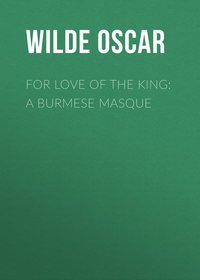Kitap dosya olarak indirilemez ancak uygulamamız üzerinden veya online olarak web sitemizden okunabilir.
Kitabı oku: «For Love of the King: A Burmese Masque», sayfa 3
Through the crowd the king passes alone and unrecognised, and disappears through double doors of heavily carved teak wood. He has hardly passed when mah phru, a very lovely girl, enters in distress. She whispers that she desires an audience of the King who has come amongst them. The few who hear her shrug their shoulders, smile, and pass on. They are incredulous. She goes from group to group, but the people turn from her with disdain. Then the great doors open, and the king is seen. The girl throws herself, Oriental fashion, in his path. Her beauty and her pathos arrest his attention and he waves aside those who would interfere. She implores the king’s protection. She is willing to be his slave. He listens with deep attention. She explains that since her father’s death she has been continuously persecuted by the village people on the double count of her Italian blood and her poverty.
The girl invites him to come to her hut in the forest and verify what she says. With a gesture he signifies that he will follow where she leads. She rises. The crowd gathers round—all are hushed to silence. the king, as one entranced, puts aside all who would in any way interfere. The girl precedes him, going from the Pagoda towards the night. When she reaches the great staircase, she beckons, Oriental fashion, with downward hand. The scene should, in grouping and colour, make for rare beauty.
SCENE III
A humble dhunni-thatched hut, set amidst the whispering grandeur of the jungle, with its mighty trees, its trackless paths, its indescribable silence. The curtain discovers mah phru and the king, who expresses his amazement at the loneliness and the poverty of her lot. She explains that poverty is not what frightens her, but the enmity of those who live yonder, and who make it almost impossible for her to sell her cucumbers or her pineapples. the king’s gaze never leaves the face or figure of the girl. He declares that he will protect her—that he will build her a home here in the shadow of the loneliness around them. He has two years of an unfettered freedom—for those years he can command his life. He loves her, he desires her—they will find a Paradise together. The girl trembles with joy—with fear—with surprise. “And after two years?” she asks. “Death,” he answers.
ACT II
SCENE I
The jungle once more. Time: noonday. In place of the hut is a building, half Burmese, half Italian villa, of white Chunam, with curled roofs rising on roofs, gilded and adorned with spiral carvings and a myriad golden and jewel-encrusted bells. On the broad verandahs are thrown Eastern carpets, rugs, embroideries.
The world is sun-soaked. The surrounding trees stand sentinel-like in the burning light. Burmese servants squat motionless, smoking on the broad white steps that lead from the house to the garden. The crows croak drowsily at intervals. Parrots scream intermittently. The sound of a guitar playing a Venetian love-song can be heard coming from the interior. Otherwise life apparently sleeps. Two elderly retainers break the silence.
“When will the Thakin tire of this?” one asks the other in kindly contempt.
“The end is already at hand. I read it at dawn to-day.”
“Whence will it come?”
“I know not. It is written that one heart will break.”
“He will leave her?”
“He will leave her. He will have no choice – who can war with Fate?”
The sun shifts a little; a light breeze kisses the motionless palm leaves—they quiver gracefully. Attendants appear R. and L. bearing a great Shamiana (tent), silver poles, carved chairs, foot supports, fruit, flowers, embroidered fans. Three musicians in semi-Venetian-Burmese costume follow with their instruments. The tent erected, enter (C.) meng beng and mah phru, followed by two Burmese women carrying two tiny children in Burmese fashion on their hips.
The servants retire to a distance. meng beng and mah phru seat themselves on carven chairs; the children are placed at their feet and given coloured glass balls to play with. meng beng and mah phru gaze at them with deep affection and then at each other.
The musicians play light, zephyr-like airs. meng beng and mah phru talk together. meng beng smokes a cigar, mah phru has one of the big yellow cheroots affected by Burmese women to-day.
